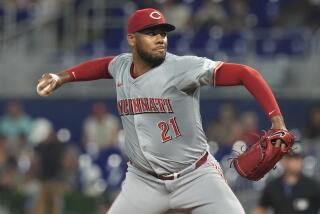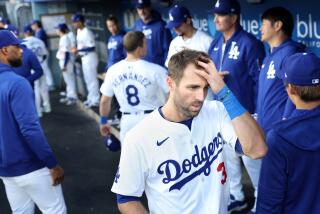Father May Know Best, but Wright Isn’t Right
Jaret Wright is driving his dad to . . .
Well, since Clyde Wright, the former Angel left-hander who won 22 games and pitched a no-hitter in 1970, gave up drinking a long time ago, he had to come up with another analogy.
“I talked to him on the phone the other night,” Wright said, “and I said, ‘Son, you’ve got to win a game soon or these tranquilizers you’ve got me taking are going to kill me.’ ”
Father and son laughed, but there have been few laughs for either.
The 23-year-old right-hander who learned the basics from his dad, became one of the nation’s most scouted pitchers at Katella High in Anaheim, was the No. 1 draft choice of the Cleveland Indians in 1994, pitched with so much poise and power in the postseason of 1997 and was looked on to provide the swaggering Indians with the one thing they are missing and the one thing they most need in October--a dominant No. 1 pitcher-- seems to have regressed on the road to stardom.
In addition, Wright has become a poster boy for baseball’s increasing number of beanball brawls, earning a headhunter reputation and invited last Tuesday to discuss his comportment with American League President Gene Budig in New York.
The reputation, dad said, is nonsense. The meeting, he added, showed an absence of sense.
“Instead of announcing to the world that you’re going to bring the kid to the principal’s office, why wouldn’t you just call the Indians quietly and say you’d like to have Jaret drop by the next time he’s in New York?” the senior Wright said.
“You’d think a league president would have some common sense and know how to use it. Jaret hasn’t been pitching well and this brought more attention to the situation, created even more pressure. People will say this is just Daddy sticking up for his son. Well, I hope to hell that’s so. It just seems like [Budig] was picking on Jaret to take the heat for all the pitchers in the league. Maybe he felt that he had to show he was doing something. I mean, what’s he going to do to me for saying this? Take my no-hit ball out of the Hall of Fame?”
Clyde Wright was a finesse pitcher, a “poor man’s Tom Glavine,” he said. The son is bigger, stronger and throws in the mid-90s.
Dad operates a pitching school in Anaheim and taught him the value of pitching inside, but it “irritates the hell out of me when people call him a headhunter,” Clyde Wright said. “That comes from the media and a bunch of guys who don’t know how the game is played and never put on a strap. I always told him never, never throw at a guy’s head, even if four or five of your teammates have been hit. I told him if that happens, drill some sucker, but never above the shoulders.”
Not all of this was created by the media, however.
The New York Yankees have been screaming about Wright since he broke Luis Sojo’s hand with a pitch in the spring of 1998.
The Boston Red Sox were angered when Darren Lewis was hit in the head during last year’s divisional playoff.
Wright would hit Lewis again on April 23--this time on the shoulder with a curveball--and it was one time too many. Lewis screamed, Wright dropped his glove, and the fight was on--compounded later by another when Boston’s Rheal Cormier took revenge, hitting Jim Thome.
Then, on May 22, Wright hit Detroit’s Tony Clark in the helmet with a fastball, and while Clark would later say he didn’t think it was intentional, teammate Jeff Weaver retaliated by hitting Manny Ramirez, precipitating a brawl in which Tiger Manager Larry Parrish put a headlock on Wright and threw him to the ground.
“Classless,” Wright said.
“What’s classless?” Parrish said. “He’s already been suspended once for hitting a guy in the head, and then he hits our guy.”
The meeting with Budig ensued (no one has revealed what was said), and on the next night, last Wednesday, Wright was rocked by the Yankees for seven runs and six hits in 3 1/3 innings, sticking Chuck Knoblauch in the hip with an errant fastball before his early departure, a troubled young pitcher mentally and mechanically, miles from the 21-year-old rookie who performed so impressively in Game 7 of the ’97 World Series and in a series of postseason starts against the Yankees and Florida Marlins.
Wright was 20-13 in his first 1 1/2 seasons with the Indians but is 8-10 with a 6.17 earned-run average since last year’s All-Star break. He has received the American League’s third-best run support this year (behind teammates Bartolo Colon and Chuck Nagy) but is only 4-3 with a numbing ERA of 7.61. The word is that hitters are sitting on his fastball because he can’t get his breaking ball over and there was speculation he was on the verge of being sent to triple A. He won a stay of demotion Friday-- but it may only be temporary.
Manager Mike Hargrove said Wright can’t continue to get whacked as he has in his last four starts, yielding a .373 average to opposing hitters. He also said that reporters and others “have to get off this headhunting business. He’s not a headhunter. He’s a 23-year-old struggling to find his command. He’s a power pitcher learning to pitch. Look at Roger Clemens, Don Drysdale, Sandy Koufax and Nolan Ryan. They hit a lot of batters when they were young.”
The Indians made pitching coach Mark Wiley the scapegoat for Wright’s second-half slide last year, but replacement Phil Regan hasn’t had any better success. Some in the organization believe Wright’s warrior mentality and stubbornness prompt him to resist needed adjustments, but Clyde Wright, his first and forever coach, sees a young pitcher who has had his mechanics changed two or three times since joining the Indians, needs time to settle in with one, and has certainly been affected mentally by the trauma of his performance and accompanying accusations.
“I know it has gotten into his head, there would be no way to keep it out,” Clyde Wright said.
Dad is hopeful that time and talent will restore his son’s confidence and certain that a demotion would be taken hard.
He tells him to keep pitching in, convinced that he has a head for the art and not an art for hitting the head.
More to Read
Go beyond the scoreboard
Get the latest on L.A.'s teams in the daily Sports Report newsletter.
You may occasionally receive promotional content from the Los Angeles Times.









